Minority entrepreneurs were reclaiming their communities — then the pandemic came
When the newly retired firefighter opened South L.A. Cafe in November, he was the latest in a string of Black entrepreneurs hoping to contain the spread of gentrification in South Los Angeles.
Facing the development of luxury condos, hotels and upscale restaurants that many residents cannot afford, Joe Ward-Wallace opened a coffee shop and market where neighbors can linger and buy fresh food. Sales increased by 10 percent each month, he said, part of a renaissance of Black-owned cafes and other businesses in the historically African American community.
“It was a tactic for cultural preservation,” Ward-Wallace said. “We were on an upward swing right before covid to reclaim our community.”
Then the coronavirus pandemic ground the nation’s economy to a halt. Overnight, business at South L.A. Cafe dropped 70 percent. Ward-Wallace furloughed nine of his 10 employees.
The recession threatens to devastate Black commercial districts and other ethnic enclaves that fuel the vibrancy, economies and identities of American cities. In many cases, these neighborhoods were the products of earlier generations of discrimination, including racial segregation and redlining. Now, entrepreneurs of color are being pushed out.
In Los Angeles, business owners, community leaders and economists predict that months of shutdowns will hasten the gentrification that has encroached on Black, Asian and Latino communities in South L.A. (formerly known as South Central), Chinatown and Boyle Heights since the Great Recession.
With a renewed surge of the novel coronavirus in California, many small businesses are not expected to survive a recession that has hammered the restaurant, retail and personal services industries in which many entrepreneurs of color are concentrated. Black, Latino and Asian workers, overrepresented in the leisure and hospitality sectors, are more likely to be unemployed as a result of the pandemic, which has also disproportionately infected and killed Black and Hispanic Americans.
“Sorry, we’re closed” signs adorn the doors of hair salons and nail shops in South L.A., where some shuttered businesses have launched crowdfunding campaigns to pay rent. Restaurants in Chinatown are surviving on takeout orders and contracts to deliver food to homebound seniors. Sidewalks in some parts of Boyle Heights have largely emptied of street vendors selling tamales and tacos.
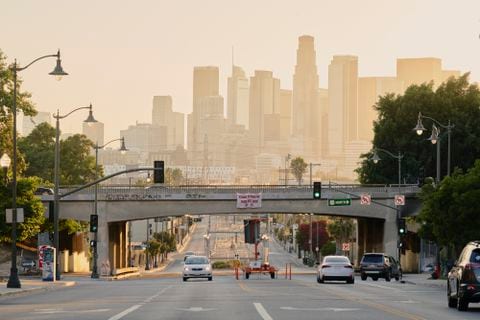 A view of downtown Los Angeles from the Latino community of Boyle Heights. Local businesses have struggled to stay open since the coronavirus pandemic spread across the city, and with it, fears of further gentrification.
A view of downtown Los Angeles from the Latino community of Boyle Heights. Local businesses have struggled to stay open since the coronavirus pandemic spread across the city, and with it, fears of further gentrification. Minority-owned small businesses tend to be undercapitalized mom-and-pop operations, with lower sales and a small financial cushion, economists say — potentially making it easier for outside investors to snap up their properties at low rates after the crisis. Black and Hispanic families lost a larger percentage of their wealth than White families during the last recession.
“The covid-19 recession is disproportionately hurting these minority businesses, making their communities more vulnerable to gentrification pressures than they already were before,” said Paul Ong, a UCLA economist and urban planner whose research focuses on minority and immigrant enclaves. “The expectation is that minorities will lag behind in the recovery, putting them in a weaker position to hang onto their businesses. That will make these areas much more attractive to outside investors in terms of profits because the prices will be lower.”
Businesses located in minority communities were less likely to receive government assistance under the $660 billion Paycheck Protection Program (PPP), according to a Washington Post analysis of data recently released by the Small Business Administration. Nationally, about three-quarters of PPP loans of more than $150,000 went to businesses in census tracts where a majority of residents are White.
The loans, which are forgivable if largely used to maintain payrolls at precrisis levels, are designed to keep small businesses afloat during the coronavirus shutdown. But an SBA inspector general’s report found that the agency failed to follow congressional guidelines to prioritize minority-owned businesses and other underserved borrowers.
Ong’s analysis of the PPP loans showed that businesses in the ethnic neighborhoods of Leimert Park in South L.A., Chinatown and Boyle Heights received disproportionately less federal support than businesses in three neighborhoods with more whites.
Many are not even applying because of linguistic or other barriers, said Ong, the director of UCLA’s Center for Neighborhood Knowledge. Minority-owned businesses are less likely to have relationships with the big banks that more easily allow them to tap into the government assistance or other safe credit options. “They are not in a great position to start with,” he said, “and they seem to be falling further behind by not getting support to weather the storm.”
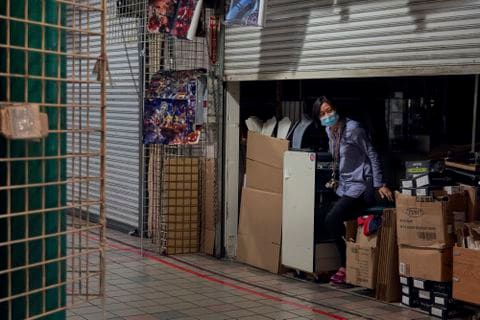 Nicole Young, 44, owner of Q Stuff, checks on her shuttered jewelry store in Chinatown. She is in the process of moving her business online because stores in the shopping plaza have been closed since mid-March.
Nicole Young, 44, owner of Q Stuff, checks on her shuttered jewelry store in Chinatown. She is in the process of moving her business online because stores in the shopping plaza have been closed since mid-March. The first sign of trouble arrived in downtown L.A.’s Chinatown in February, seven weeks before California Gov. Gavin Newsom (D) issued a statewide stay-at-home order to combat the coronavirus.
Instead of the usual hordes of tourists who descend upon the one-square-mile neighborhood for the annual Lunar New Year parade, Nicole Young noticed lots of space on the streets and sidewalks surrounding the Dynasty Center, where she owns a small store called Q Stuff that specializes in custom-made beaded jewelry. The nearby plaza, with red lanterns strung between pagoda-style buildings, remained half-empty.
Fear as well as racist associations with a virus that had its first epicenter in Wuhan, China, were keeping people away from Chinese restaurants and other Asian-owned businesses — just as in other Chinatowns across the country amid a flare in anti-Asian sentiment.

One of the first areas to feel the economic impact of the coronavirus, Chinatown has been empty of tourists since February.

Young makes custom beaded jewelry. But since tourism to Chinatown stalled, she fears she may have to close her store for good.

Ducks hang in Hop Woo BBQ & Seafood Restaurant. At least five Chinatown restaurants have permanently closed since the coronavirus pandemic began.
TOP: One of the first areas to feel the economic impact of the coronavirus, Chinatown has been empty of tourists since February. BOTTOM LEFT: Young makes custom beaded jewelry. But since tourism to Chinatown stalled, she fears she may have to close her store for good. BOTTOM RIGHT: Ducks hang in Hop Woo BBQ & Seafood Restaurant. At least five Chinatown restaurants have permanently closed since the coronavirus pandemic began.
“I could sense that people really didn’t want to come to shop and eat in Chinatown,” said Young, who began wearing a mask in January but removed it when she sensed customers were uncomfortable. “I didn’t want people to think I was sick.”
By mid-March, the indoor flea market housing her store and dozens of other stalls selling traditional Chinese dresses, suitcases and tchotchkes closed, in line with government orders. Four months later, stores remain shuttered. Young, who had plans to expand before the pandemic, now fears she may never reopen. “Why would I stay here and pay rent when there is no business?”
Instead, she’s brushing up on her photography and written English skills and learning how to build a website so she can move her business online. She worries something will be lost with e-commerce — her ability to explain Chinese culture to tourists. And with it, something greater.
“I see Starbucks and American franchise stores close to Chinatown’s entrance,” Young said. “The coronavirus may force Chinatown to disappear faster. All the businesses will look no different from the shopping malls in the rest of America.”
Young said she started to apply for a PPP loan in May. But after neighboring business owners told her it was a waste of time because they did not receive any money, she never bothered completing the application.
For other businesses, it’s already too late. At least five Chinatown restaurants have closed for good despite Congress having passed the $2.2 trillion Cares Act at the end of March, said Peter Ng, chief executive of L.A.’s Chinatown Service Center.
To help some survive, Ng’s nonprofit contracted with restaurants to prepare and deliver meals to 1,300 senior housing residents who no longer had safe access to grocery stores and communal kitchens.
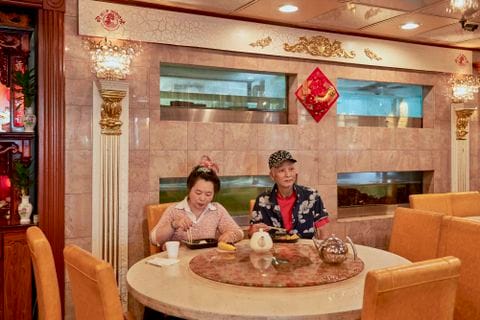 Judy Cen and her husband, Yening “Lupe” Liang, the owners of Hop Woo BBQ & Seafood Restaurant, lost half their daily business because of the coronavirus shutdown. They are staying afloat with a federal loan, takeout orders and a contract to deliver meals to homebound seniors.
Judy Cen and her husband, Yening “Lupe” Liang, the owners of Hop Woo BBQ & Seafood Restaurant, lost half their daily business because of the coronavirus shutdown. They are staying afloat with a federal loan, takeout orders and a contract to deliver meals to homebound seniors. The senior meals program helped Yening “Lupe” Liang, owner of Hop Woo BBQ & Seafood Restaurant, stay afloat. Liang, who worked in Tijuana before opening his Mexican-influenced Cantonese-style restaurant in Chinatown in 1993, lost more than half his daily business as a result of the pandemic and had to cut his staff of two dozen down to just a handful of family members. His wife runs the front of the house. Their two daughters take orders over the phone, pack food and collect money. He is the chef, preparing 300 boxed lunches a week of rice, eggplant and tofu for seniors at $6 apiece.
His landlord has granted a rent deferral, but Liang said delayed payments are due in full by 2021. For now, he said, Hop Woo is able to survive on takeout orders, as well as a PPP loan of $52,000. “Otherwise, we would have had to close permanently,” said Liang, whose cooking has been featured on local Chinese- and Spanish-language TV.
He is not optimistic about Chinatown’s future, even if customers are eventually allowed to dine inside again. “People have already lost so much. In Chinatown, a lot of restaurants and stores will be closed forever. They don’t have a choice.”
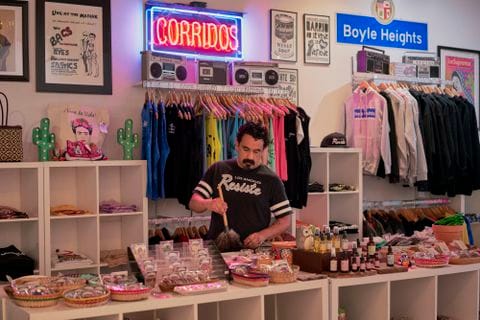 Nico Avina, 46, owns Espacio 1839, which has been shuttered since mid-March. It sold apparel and books representing Latino cultures in Boyle Heights and hosted a gallery and community radio.
Nico Avina, 46, owns Espacio 1839, which has been shuttered since mid-March. It sold apparel and books representing Latino cultures in Boyle Heights and hosted a gallery and community radio. Less than three miles away, across the Los Angeles River in the Latino community of Boyle Heights, Nico Avina remains haunted by what happened to his business and neighborhood after the 2008 recession.
Avina, an artist, owns Espacio 1839, a bookstore, gallery and community space. It is the second incarnation of a concept his wife, Myra Vasquez, had launched in 2004, before the economy crashed and their store closed in 2009. Theirs was hardly the only casualty.
All across town, local businesses disappeared. Large galleries spilled across the river from the neighboring Arts District, and developers tried rebranding Boyle Heights as “BoHe” and “East Bank L.A.” A real estate agent promoted a bike tour of Avina’s working-class community in 2014, distributing fliers in the Arts District that said, “Why rent downtown when you could own in Boyle Heights?”
“Articles quoted gallery owners saying this was nothing before they got here, completely dismissive of the existing community and the fact that this was the Chicano mural capital of the world,” Avina said.
The community staged intense protests against gentrification, and at least six galleries have closed or moved out of Boyle Heights in recent years. But more luxury high-rise apartments are slated for construction. Warner Music Group relocated its headquarters from Burbank to a former Ford factory just across the river in 2019. Spotify also moved its regional headquarters to the Arts District. Avina and other activists predict that a slew of upscale businesses will move into Boyle Heights to cater to the newest neighbors.
“I can just imagine what’s going to happen this time around, especially since the Arts District is fully developed now,” Avina said. “It’s going to completely change the character of a community. It will be artificial — like replacing the natural flavors of cane sugar with corn syrup. It might be sweet, but in the end, it will kill you.”
In 2012, Avina and Vasquez revived their concept for a community creative space with the opening of Espacio 1839, leasing a storefront steps from Mariachi Plaza, where musicians rehearse and Avina had been selling T-shirts. The landlord, it turned out, had owned the apartment building where Avina grew up, and recognized him from his Mexican immigrant parents’ food stand as “the taco man’s son.” He offered to rent the space to Avina instead of putting it on the market.

Musicians rehearse and book gigs from Mariachi Plaza.

Leonardo Acosta, a single father of three daughters, has been a hot-dog vendor for 15 years. He used to make about $400 a week, but he has not worked for five months because of the pandemic. “The entire community is suffering,” he said.

A man prepares flowers to sell in Boyle Heights, a Latino neighborhood that has been gentrifying since large galleries spilled across the river from the neighboring Arts District after the Great Recession.
TOP: Musicians rehearse and book gigs from Mariachi Plaza. BOTTOM LEFT: Leonardo Acosta, a single father of three daughters, has been a hot-dog vendor for 15 years. He used to make about $400 a week, but he has not worked for five months because of the pandemic. “The entire community is suffering,” he said. BOTTOM RIGHT: A man prepares flowers to sell in Boyle Heights, a Latino neighborhood that has been gentrifying since large galleries spilled across the river from the neighboring Arts District after the Great Recession.
Avina, Vasquez and their two sons live just blocks from their store. Until they shut Espacio 1839 in mid-March, it hosted an Internet radio station and community podcasts, sold T-shirts that Avina designed, held poetry and book readings, showcased the work of local artists, and offered free writing, photography and printmaking workshops. One wall of the store depicts a seven-foot-tall Virgen de Guadalupe staring down at an eviction notice, a painting Avina titled “Lupita Was Displaced.”
Now his family is surviving on savings, and making rent with a newly created store website that sells T-shirts and homemade masks. Vasquez runs a side business selling gelatinas from their home. The couple had initially planned on reopening the store during weekends in July — or by appointment only. But they scrapped that idea after coronavirus infections in L.A. skyrocketed again.
“We’re just trying to survive. Out of the four months we’ve been closed, two of those months have been assisted by others,” Avina said.
L.A. poet Yesika Salgado, who held readings at the store, donated one month’s rent. A national fundraiser for small businesses, featuring musicians including local band Chicano Batman, covered another month’s rent. Avina doesn’t think Espacio 1839 can survive much beyond six months of closure.
“One of our biggest fears is this is going to speed up the gentrification process,” he said. “It’s not just a threat. It’s real. If we look at history and what happened in 2008, there were sharks waiting to take their vacant spots.”
He doesn’t want to let his community down by closing again for good and giving outsiders an opportunity to take over. Proceeds from local businesses are reinvested back into the neighborhood — into small grocers and food vendors so they could feed their families too, he said.
Avina laments what will be lost with thousands in his community out of work, and local entrepreneurs getting priced out: daily rhythms like the cinnamon-chocolatey smell of champurrado in the morning, replaced by vendors selling jicama and pineapples in the afternoon and tacos al pastor in the evening as norteñas and cumbias blare from open windows. How long, he wonders, will the sound of guitars and trumpets continue wafting from Mariachi Plaza?
“With something unforeseen like coronavirus, it’s a left hook to a community out of nowhere,” he said. “In the fight against gentrification, we have to occupy space. That’s what we’re trying to do with Espacio.”
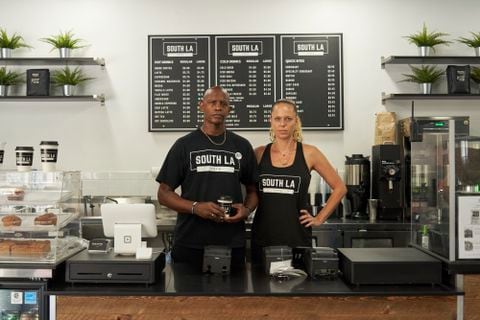 Joe and Celia Ward-Wallace, owners of South L.A. Cafe, opened their coffee shop near Leimert Park in November. Joe, a retired firefighter, was the latest in a string of Black entrepreneurs hoping to stop the spread of gentrification in South Los Angeles.
Joe and Celia Ward-Wallace, owners of South L.A. Cafe, opened their coffee shop near Leimert Park in November. Joe, a retired firefighter, was the latest in a string of Black entrepreneurs hoping to stop the spread of gentrification in South Los Angeles. That’s what Black entrepreneurs were trying to do around Leimert Park, the cultural center of the African American community in South L.A., hoping to halt a 25 percent drop in the Black population since the Great Recession.
At least five Black-owned coffee shops have opened in recent years. They welcomed lower-income residents to plug in their computers and stay all day. They featured vegan menus and hosted political panels, after-school cooking classes and talks on gentrification. But some community leaders fear that the only businesses that will survive the coronavirus recession will be the fast-food chains ubiquitous in this food desert.
Joe and Celia Ward-Wallace, owners of the new South L.A. Cafe, had spent decades fighting for food justice and racial economic equality in South Central before opening their own coffee shop. They decided halfway through construction last year to lease a second neighboring space where they would sell affordable, fresh food.
As the coronavirus outbreak worsened in China in January and February, just months after opening, the couple discussed whether they should close their business. Instead they stayed open, selling $35 grocery boxes with essential provisions: beans, rice, pasta, vegetable broth, almond milk, fruits and vegetables, toilet paper and medical masks. Nonprofits, corporations and individuals sponsored hundreds of boxes each week for them to hand out to financially struggling customers.
They launched an online ordering app for curbside pickup, expanding to grocery and meal delivery. They’ve asked the community for recurring $10 monthly donations; more than 500 people have signed up.
Pop stars Ariana Grande and Beyoncé promoted South L.A. Cafe along with other Black-owned businesses during the national protests over police brutality and systemic racism.
“People are elevating us because of the civil unrest happening right now around racial justice,” Ward-Wallace said. “But given what’s happening with covid, it’s such a frightening projection so we don’t know what that will mean for business moving forward. I think the majority of Black and Brown businesses are going to really struggle to reopen because they are falling deeper and deeper into a hole.”
The Ward-Wallaces say they have dipped into their personal savings to keep the business afloat and still owe thousands of dollars in back rent.

Customers wait for their cars to be washed in Leimert Park, the cultural center of the African American community in South L.A. The Black population has dropped by 25 percent in the neighborhood since the Great Recession.

Bronwyn “Ms. Bronnie” Hardy, 70, owner of Vergess Palace De Bella Donna hair salon in South L.A., has a long-standing policy of styling hair at no charge if someone in the neighborhood has a job interview and can’t afford to pay. “Economically, the coronavirus has broke us,” she said.

Meals prepared by local restaurants, including Dulan’s on Crenshaw Soul Food Kitchen, are distributed to those in need at the Good News Missionary Baptist in South L.A.
TOP: Customers wait for their cars to be washed in Leimert Park, the cultural center of the African American community in South L.A. The Black population has dropped by 25 percent in the neighborhood since the Great Recession. BOTTOM LEFT: Bronwyn “Ms. Bronnie” Hardy, 70, owner of Vergess Palace De Bella Donna hair salon in South L.A., has a long-standing policy of styling hair at no charge if someone in the neighborhood has a job interview and can’t afford to pay. “Economically, the coronavirus has broke us,” she said. BOTTOM RIGHT: Meals prepared by local restaurants, including Dulan’s on Crenshaw Soul Food Kitchen, are distributed to those in need at the Good News Missionary Baptist in South L.A.
The Black Lives Matter movement has made people recognize that Black-owned businesses are especially vulnerable because of the pandemic, said Greg Dulan, owner of the famed Dulan’s on Crenshaw Soul Food Kitchen. Anonymous donors have paid him to feed coronavirus first responders for six weeks. Corporations he never heard from in the past are reaching out to discuss future catering and promotional opportunities. But he wonders how long that surge in support will last.
“If we’re going to have a strong African American business community which helps to uplift African American neighborhoods, then some of these things that are happening have to continue long-term,” Dulan said.
Dulan, whose cafeteria-style restaurant opened weeks after the 1992 Rodney King uprising, is planning for the future. He is in the process of buying an adjoining property that he plans to turn into a parking lot and also use for his catering headquarters.
A Howard University graduate, Dulan said he took a cue from Ben’s Chili Bowl, a Washington, D.C., institution that survived U Street’s gentrification in part by buying the adjoining property and opening the more upscale Ben’s Next Door in 2008.
Dulan, too, wants to control his real estate — and his fate — in the face of gentrification. Despite his decreased profits due to the recession, he made the calculation to buy the property now, before he’s priced out.
“The only way African American businesses are going to survive is we have to own our own stuff,” Dulan said. “I’m determined for there to be soul food in the Crenshaw district for as long as I’m able to do it. This is Black Los Angeles. That’s who I serve every day.”
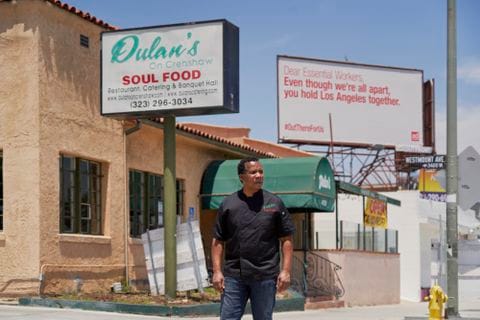 Greg Dulan, owner of Dulan’s on Crenshaw Soul Food Kitchen, said he has never seen such a surge in support for Black-owned businesses in his more than 30 years in the restaurant industry.
Greg Dulan, owner of Dulan’s on Crenshaw Soul Food Kitchen, said he has never seen such a surge in support for Black-owned businesses in his more than 30 years in the restaurant industry. Andrew Ba Tran contributed to this report. Design by Clare Ramirez. Photo editing by Annaliese Nurnberg.






